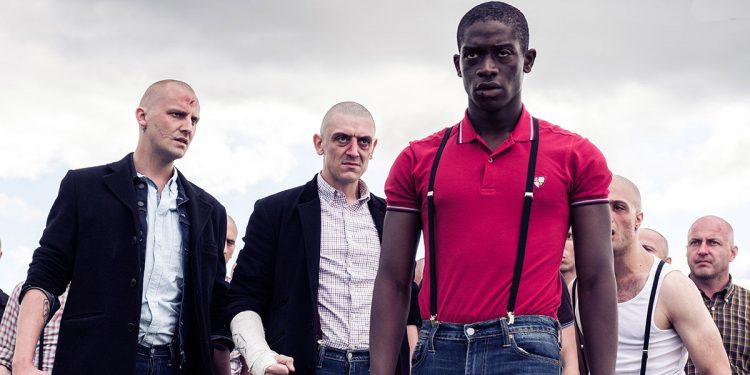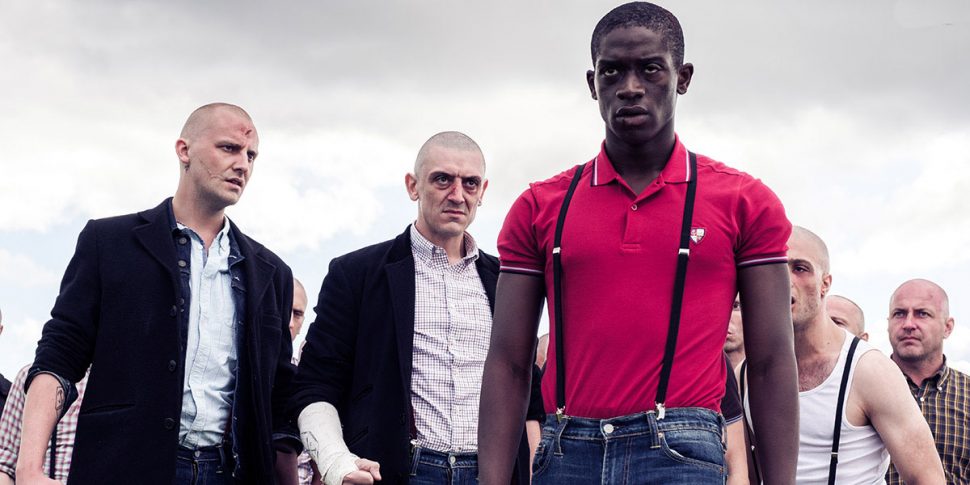The French/German period piece “Angelo” and the lurid British pop-film “Farming,” both premiering at the Toronto International Film Festival (TIFF) in September, exist on starkly different ends of filmmaking but come together to ask a similar question: What does it mean to be black in a world that sees your skin as a curiosity?
“Angelo” tells the story of Angelo Soliman, a freemason of whom little is known and little remains. And so, from the inception, Markus Schleinzer’s film disconcerts us with its oddness. The title of the film is more sardonic confrontation than earnest representation for although everything in the film concerns “Angelo,” this Viennese “court moor,” the film really holds a mirror to the ice-cold remoteness of 18th century Vienna. It is low on emotion and instead high on formalist structures. The sumptuous production design and the swoony cinematography combine to overwhelm, disorient and distance us. Everything on the surface of “Angelo” looks compelling but it’s a structuralistic dream that gives way to a nightmare. Things are awry from the inception, with the classic 4:3 aspect ratio teasing something just slightly off in ways that we cannot quite explicate at first.

Adewale Akinnuoye-Agbaje’s “Farming,” on the other hand, takes place two centuries later in 1960s London. The title refers to the euphemism for the social experiment of the time where African children were farmed out to white working-class families in the UK to grant them citizenship. The time and the country differ, but the misconceived notion of white Europe as a saving grace for African children remains. If “Angelo” is an ornate representation of coldness, “Farming” is a frenetic, outburst of red-hot anger. Enitan, the protagonist of “Farming,” is taken in by a white couple with almost a dozen black children. The situation is less impressive than his biological parents seem to think, and things come to a head when he becomes part of a racist skinhead gang that targets people who look like him.
Both, Angelo and Enitan are black men who are nominally free in societies which loathe their skin colour. The important case that both “Farming” and “Angelo” make is that to be excused as “special” in a world where your race is a liability is no specialness at all. And, so, Schleinzer (he co-writes the film with Alexander Brom) complicates the specialness the Countess and the court claim in Angelo by emphasising his silence. Angelo’s silence in his story is not a formal liability but a shrewd literalising of the limits of blackness in a racist society. That Angelo feels like a mere afterthought in his own story is an exclusion that smarts but it’s to Schleinzer’s credit that in representing Angelo he does not placate us by filling in gaps but instead forces us to contemplate the life he lived, forever on show, all the way down to the film’s exhausting final sequence, where the dead Angelo is robbed a burial and made into a figure in a cabinet of curiosities.
“I’m a son of Africa, but a man of Europe,” Angelo says midway through his film. But the truth might be somewhere removed for both he and Enitan. Both cross an ocean to meet a world that does not want them as they are, and are thus thrust into lives of displacement.
Meanwhile, French director Jacques Audiard’s English-language debut, the unusual and sprawling comedy-western, “The Sisters Brothers” intersects on race and masculinity. The film is an adaptation of a Patrick deWitt novel that was optioned by John C. Reilly’s production company before its official release. The film follows the eponymous Sisters Brothers (played by Reilly and Joaquin Phoenix), a pair of assassins in the mid-19th century who become entangled with the events of the California Gold Rush. The merciless gunfight that opens the film will not be the last. The men are journeying to track down Hermann Kermit Warm, a chemist with an idea that a rich man wants. That’s the bare bones of the plot, which depends less on chronological progression than on its sprawling discursiveness.
The brothers’ journey to find Warm becomes a kind of a road-trip movie augmented by humour and violence. We watch them engage with each other, learn of their difficult relationship and watch the film flirt with becoming a character study as we come to know these men. But this road trip has a clear purpose. Further ahead of them, Warm is travelling to California trailed by John Morris – a detective assisting the brothers in finding him. It’s with the introduction of Morris and Warm to the narrative that the film begins to gestate into what it’s really about. Rather than the expected tale of male bravura, it is about the way that men interact with each other. Audiard picks at the nature of male-male relationships, filial and otherwise. So we watch Phoenix’s erratic and hot-headed Charlie Sisters torment and exasperate his more diffident brother Eli, and that relationship is offset by the steely Morris and the gregarious Warm.
“The Sisters Brothers” is always trying to upend or hoodwink us. And so the most terrifying moments (a deadly spider, a terrifying madam, a swift betrayal) are played in ways that offset their thrills to become comedic, or ironic. At first, the tendency frustrates. What exactly is Audiard doing here, we might ask? But then it starts to win you over, the same way that the gentle Warm, played by Riz Ahmed, seems to beguile those around him. The South Asian’s Ahmed casting as Warm against a sea of white complicates the way the narrative deals with him. The “Sisters Brothers” in this way is not interested in a new idea of men or behaviour, especially when read against some of Audiard’s French work, but it’s not less complex for this fact. The film is never casual, and never less than ambitiously rendered. Alexandre Desplat’s score is one of my favourites of the festival and is Audiard’s most dependable technical supporter in finding the right tone. It’s the type of musical work that’s so in touch with the sprawling nature of the film. For “The Sisters Brothers” is not an easy watch. Not for the violence, which is stark, but for Audiard’s deliberate intention to subvert. The narrative sprawls, it’s odd, it’s sometimes frustrating but when it hits its notes it’s consistently rewarding. Its final shot, for example, feels incongruous when put against its first. But it is intentional: these men are not just one thing. “The Sisters Brothers might project an air of static masculinity but there’s more going on here than the expected male blustering.
More of Andrew Kendall’s coverage of this year’s TIFF releases can be found at https://www. stabroeknews.com/features/reel-encounters/

